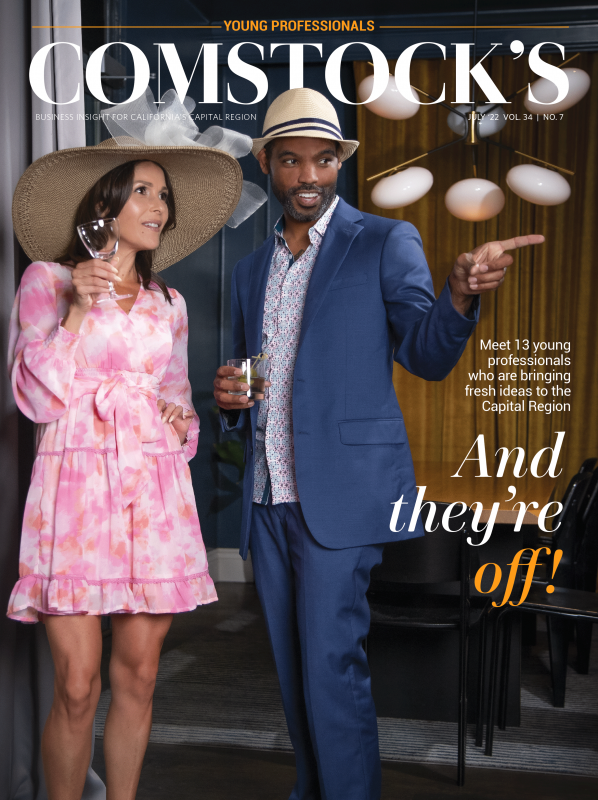Twenty-somethings are told a singular story of the ideal career trajectory:
Go to college or get training and end up in your field of study. Then climb the ranks of one or two companies. Each step will be made clear as you’re ready to ascend the hike up the career ladder, continuing to build your expertise like carefully curated blocks in one key area. Always forward. Never backward or side to side. Clear and obvious.
As it turns out, career progress isn’t linear, and you learn a lot along the way. Your path may occasionally lead you backward, and it’s nearly always unclear. I was 20 years old when I moved to Sacramento. I had a degree — one that I was confident wouldn’t land me a job because of its specialty (fashion marketing), and a big question mark above my head.
What would I find to do in Sacramento? Where should I be at this point in my life?
Soon I found myself with a local design firm managing the day-to-day marketing and communications. I made great connections — some becoming lifelong friends — and I added several notches of managerial experience to my belt. I learned what I did and didn’t like and what I was and was not good at, but I still felt I hadn’t found the right fit. I was getting closer, but I wasn’t there yet.
Seeking more opportunities to learn, I tried my hand at other roles: project management, client services, internal, external, and people management. And with each position, I gathered more data.
Fast forward almost ten years, and I find myself sitting squarely in the space I knew I would find — a marketing role that marries data and creativity — though it matches virtually none of the items on the list I’d initially created for my ideal career path.
I went back to my original career path and fractured it into several lists. I checked off the items on my YES list — public speaking, marketing, helping people — and my NO list — anything with details, like data entry and creating content calendars. From there, I built new lists of things I learned I loved: education and workforce development, autonomy and research.
If you’re a 20-something realizing your list no longer matches your values or goals, or if you know a 20-something who is looking ahead at their life, head tilted to the side, staring at the daunting road ahead, here are some ideas for your consideration:
- Make the next best move. The good (and bad) news is we can’t see the future. We are only responsible for the minutes ahead. So instead of consulting the 35-year-old you who has yet to exist, find what best positions the version of you several days from now and go with that.
- No mistakes, just opportunities. I often joke that I don’t fail; I grow. You’re going to mess up; mistakes are part of life. But the learning you pull from those uncomfortable moments could be the best thing that happens to you. Interpreting missteps as data will help you figure out what’s next.
- Ask yourself, “What gets your goat?”: When I started at my company almost five years ago, one of the tenured employees asked me a question in my first week: “What gets your goat?” In other words, what problem in the world would you solve if you had the chance? What keeps you up at night? What bugs you so much that you want to fix it? Whatever that might be, make it your work. Following a passion is essential because exhaustion inevitably sets in, and it’s easier to persist if you love what you do and who you help.
“You might not find the right fit all at once, in one role, or even at one company. Over the years, you’ll change your mind, change your skills, and change your attitude.”
Taylor Toledo, director, 3fold Communications
- Time is a tornado. I’m not going to get existential, but try to think of time as less linear. I like to picture it as a tornado — cylindrical, moving upward, but around and around until it stretches higher (or lower). This is you and your experience. Sometimes you’ll be at the top of the tornado, crushing a presentation, and then you drop to the bottom, realizing you aren’t passionate about your job anymore. With each experience, you’re moving up and up but also side to side.
Now to address the last and perhaps most deceiving career myth for 20-somethings — that we should love our work all the time. This might be true for some, but more often than not I’ve found that you might not fall in love with your work quickly or easily. And if you do, you may fall out of love with it just as soon. Circumstances change, we change, and the way we feel about our work changes, too.
You might not find the right fit all at once, in one role, or even at one company. Over the years, you’ll change your mind, change your skills, and change your attitude. Sometimes, you will have to make decisions with no information other than your gut and what you Google. But then the good parts unfold, too. You become wiser and braver and more interested in the world and its people. The conversations you have become richer and deeper, and the problems you solve more impactful. Career progression is not clear, not simple, and not linear, but very, very worth it.
Good luck out there, and don’t be afraid to go backward or sideways to make it happen.
Taylor Toledo is a director for 3fold Communications and the Program Chair for Metro EDGE, a Metro Chamber Foundation program. She has lived in Sacramento for almost 10 years and is passionate about workforce development in the region.
–
Stay up to date on business in the Capital Region: Subscribe to the Comstock’s newsletter today.
Recommended For You

Diversity Is Your Workplace’s Biggest Strength
Active listening, personal bias training and slowing down can help workplaces embrace diversity in a more meaningful way
Guest writer Cassandra Walker Pye shares how bringing
together people with varied backgrounds can lead to
more thoughtful and creative ideas.

Cyberbullies in the Workplace
Five ways to protect employees from virtual harassment
The emergence of remote work has broadened the horizons for
cyberbullying. We share the warning signs and five ways to
protect employees.

Turn Fear Into Your Superpower
Five tips to become the hero of your own career story
It’s natural to feel afraid of change, but turning fear into
excitement can help you take control of your career.

Why Workplace Culture Matters
Investing in your team and positivity at work should be a daily
priority. Here are four steps to make that happen.

How to Handle Political Discourse in the Workplace
Political, social, economic and personal issues can impact employee performance. Here are five ways employers can mitigate or diffuse potential conflicts.




